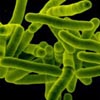Domain Bacteria |
|
 |
The High Gram-Positive (or Actinobacteria) are a large group of non-mobile, spore-forming bacteria. Most live in soil, playing a crucial role in the decomposition of organic materials. |
The older name Actinomycetes refers to the braching filaments some High Gram-Positives form, which resemble the mycelia threads of the unrelated Fungi. DNA chemistry distinguishes the High Gram-Positives differ from the Low Gram-Positives.
|
|